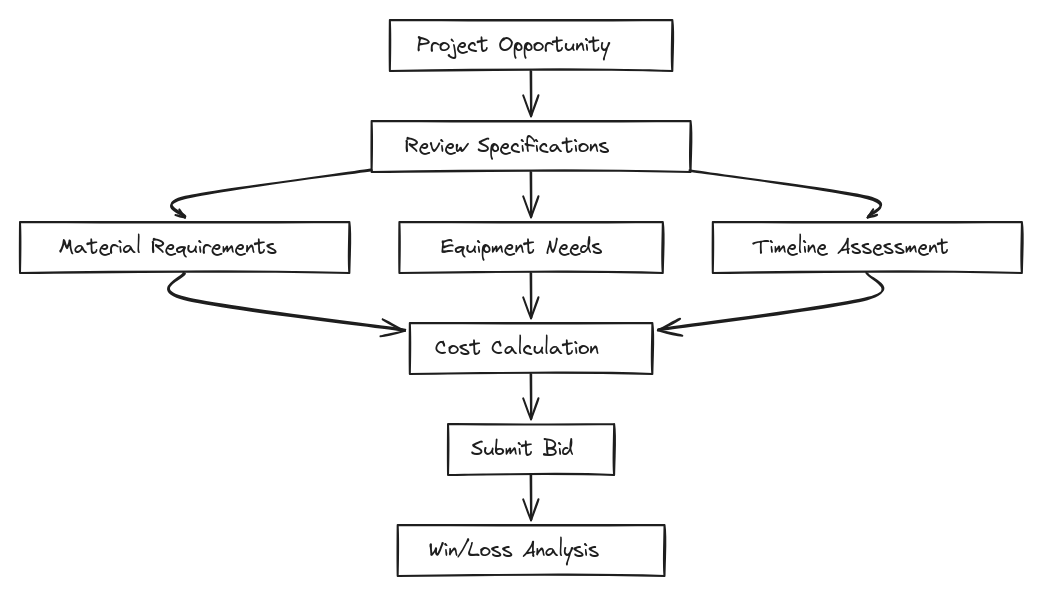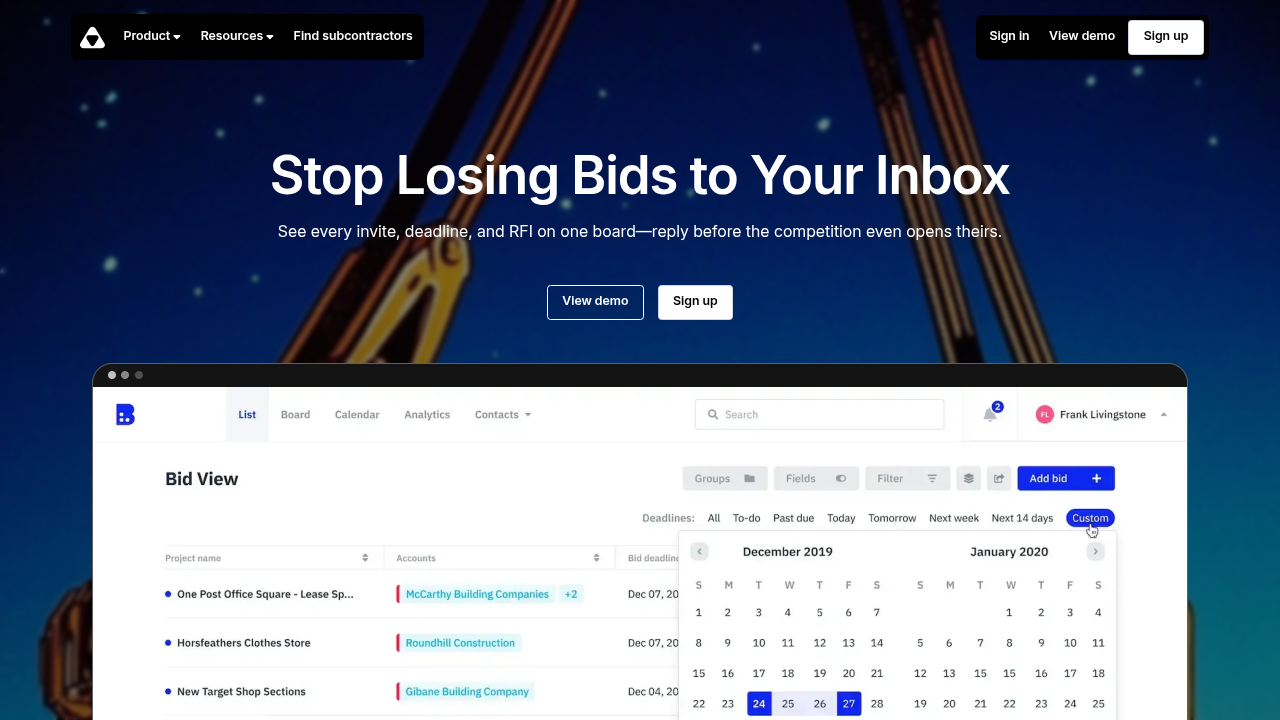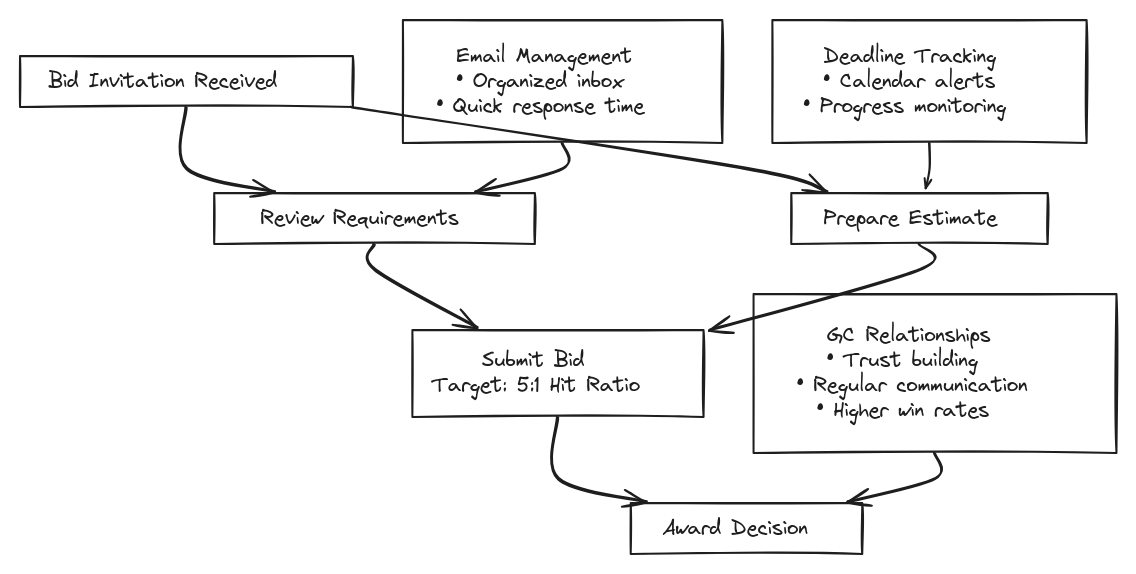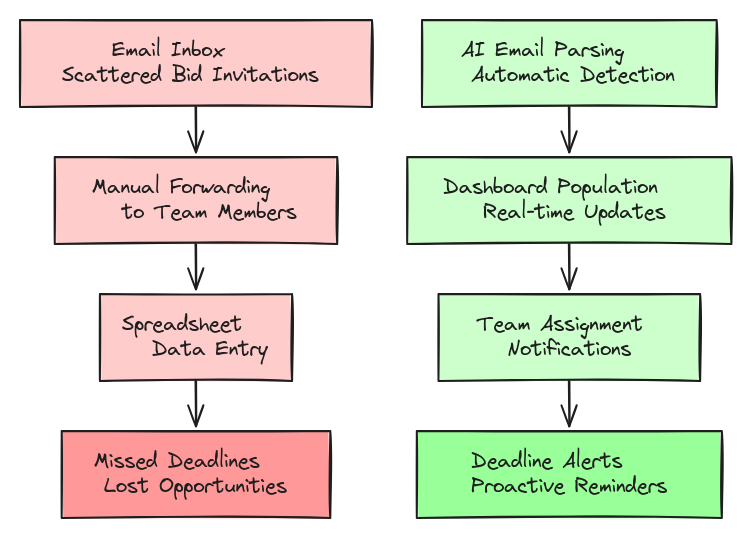Many concrete contractors lose profitable jobs not because their bids weren't competitive, but because they missed deadlines buried in spam folders or spent hours manually sorting through irrelevant electrical and plumbing invites.
The contractors who consistently win work have moved beyond spreadsheet chaos and email hunting to automated systems that capture every opportunity. A proper bid board eliminates the administrative bottlenecks that kill your competitive edge while connecting you to verified concrete opportunities. Let's dig into how to build a systematic concrete bidding process that maintains winning ratios in 2025.
TLDR:
- Successful concrete contractors maintain 5:1 bid-to-win ratios through systematic project evaluation, not luck
- Downtobid's AI automatically scans your email for concrete bid invites, even ones buried in spam folders
- Custom filters target concrete-specific keywords like "foundations" and "flatwork" to eliminate irrelevant projects
- Automated deadline tracking and team assignment prevents missed submissions and internal coordination issues
- Built-in analytics reveal your win rates by project type, helping you focus on most profitable concrete work
What is Concrete Bidding
Concrete bidding differs greatly from general construction bidding due to specialized requirements. You must account for material specifications like PSI ratings, slump requirements, and cure times. Weather conditions affect concrete work more than most trades, requiring careful scheduling considerations.
The timing of concrete pours creates unique constraints. You can't simply reschedule a pour without major cost implications. This makes accurate project timeline estimation important for competitive bidding.
Equipment needs also set concrete work apart. Pumps, mixers, and finishing tools require specific scheduling and transportation logistics that impact your bid calculations.
Concrete bidding involves thoroughly reviewing project specifications to understand the grade of concrete required, reinforcement needs, and any special additives or treatments. This makes sure your bid reflects the actual complexity and requirements of the project. For concrete contractors, bidding is the gateway to winning profitable work.

Concrete contractors who master the bidding process focus on projects that match their equipment strengths and crew expertise, rather than chasing every available opportunity.
Why Concrete Bidding Matters
Proper bidding practices lead to better project selection and improved profit margins. When you focus on the right opportunities, you build long-term client relationships that generate repeat business and referrals.
Most construction bids are awarded to the lowest bidder, but concrete work often involves additional qualification considerations due to the specialized nature of the trade. Effective bidding directly impacts your profitability and business growth path. Construction contractors who implement systematic bidding processes see measurable improvements in win rates and project profitability. They spend less time chasing unprofitable work and more time delivering quality results on well-matched projects.
The key is understanding that Success requires building strong relationships with owners and general contractors to identify projects that align with your skills and resources. You need to review each opportunity carefully, checking profitability potential, project size, and risk factors before investing time in bid preparation. Poor project selection leads to thin margins, stressed crews, and damaged relationships.
Analytics play an important role in this process too. Understanding your win rates by general contractor, project type, and geographic area helps refine your bidding strategy over time.
What Concrete Contractors Need to Succeed
Because concrete bidding requires specific skills beyond basic construction knowledge, it's actually project management skills which separate successful bidders from those who struggle. The most successful contractors develop standardized processes for reviewing opportunities. This consistency helps them make faster decisions about which projects deserve their attention and resources.
Specifically there are 4 main non-apparent skills you want to hone when bidding on concrete jobs:
Material Knowledge
Why It Matters: Concrete specs vary widely
Impact on Bidding: Accurate cost estimation
Equipment Planning
Why It Matters: Specialized tools required
Impact on Bidding: Proper resource allocation
Weather Assessment
Why It Matters: Affects pour scheduling
Impact on Bidding: Realistic timeline development
Crew Coordination
Why It Matters: Multiple skill levels needed
Impact on Bidding: Labor cost accuracy
Cost estimation abilities must account for concrete's unique characteristics. Material waste factors, delivery logistics, and quality control requirements all influence your final bid numbers.
You need systems for tracking multiple opportunities simultaneously while maintaining accuracy in cost calculations. You need to accurately assess crew requirements based on project size and timeline, considering skill levels needed for different phases like forming, pouring, and finishing.
Time estimation becomes important for each project phase, from site preparation through final curing. Use historical data from similar projects while factoring in potential weather delays and other variables that commonly affect concrete work. Understanding specialized equipment requirements helps you bid competitively. Knowing when to rent versus own equipment, and how to schedule shared resources across multiple projects, directly impacts your bottom line.
Build from Scratch vs Using Downtobid
Building a concrete bidding system from scratch means creating spreadsheets for each project, managing endless email chains, manually tracking deadlines, and developing your own project database. This approach demands major time investment and creates multiple opportunities for human error.

You'll spend hours each week sorting through emails, copying project details into tracking sheets, and following up on deadlines. Important opportunities get buried in spam folders or overlooked in busy inboxes. Manual systems also make team coordination difficult. When multiple estimators work on different projects, keeping everyone updated on status changes and deadline shifts becomes a constant challenge.
Downtobid's bid tracking gets rid of these manual processes through automated email scanning and centralized project management. The system connects directly to your Gmail or Outlook inbox, automatically organizing bid invites by project. AI-generated summaries show scope requirements specific to concrete work, helping you quickly check whether a project fits what you can do.
This allows you to focus on what you do best: reviewing projects and preparing competitive bids, rather than administrative tasks.
Tip #1: Automate Bid Detection in Your Email
Detecting bid opportunities in your email inbox requires constant vigilance. Invitations arrive at all hours, often with subject lines that don't clearly indicate bidding opportunities. Important invites frequently end up in spam folders, especially from new general contractors.
Consider a concrete contractor who manually checks email twice daily. A Friday afternoon invitation for a Monday deadline could easily be missed over the weekend, costing thousands in potential revenue. Without automated detection, you might find a perfect project opportunity three days after the deadline passed. That's lost revenue and damaged relationships with potential clients.

Downtobid's Gmail and Outlook integration automatically scans your inbox for bid invitations, extracting project details without requiring manual forwarding or data entry. The system recognizes bid-related keywords and phrases, even in emails with unclear subject lines. Even emails buried in spam folders are captured and organized. The AI identifies concrete-specific terminology like "flatwork," "foundations," "structural concrete," and "site prep" to make sure relevant opportunities reach your attention.
This automation runs continuously in the background, so you never miss an opportunity due to timing or email management issues. New invitations appear on your bid board within minutes of arrival.
Tip #2: Create Custom Rules to Identify Concrete Projects
Finding concrete-specific opportunities traditionally requires manually searching through dozens of general construction invitations. You spend valuable time reading through irrelevant electrical, plumbing, or HVAC projects to find the concrete work that matches your expertise.
This manual filtering process is time-consuming and prone to oversight. Important concrete projects can be overlooked when buried among unrelated trade invitations.
Downtobid's filtering system allows you to target concrete-specific opportunities through keyword automation. Set up filters for terms like "concrete," "masonry," "foundations," "flatwork," "sidewalks," or "structural slabs" to make the system focus on relevant projects. Custom business rules can automatically accept, decline, or assign incoming invites based on project type, location, or size requirements. For example, you might automatically decline projects under $10,000 or outside your service area.
The system can also flag high-priority opportunities that match your preferred project types. If you specialize in commercial foundations, the system will show those opportunities while filtering out residential driveway work. These rules save hours of manual review time while making sure you never miss opportunities that align with your business focus. Contractors using these filters report spending 60% less time on bid evaluation.
Tip #3: Set Up Project-Specific Tracking
Concrete projects often involve multiple phases with different requirements. A commercial foundation might include excavation coordination, rebar placement, multiple concrete pours, and finishing work spread across several weeks.
Tracking key details at the project level is important for successful concrete bidding. Each concrete job involves multiple variables: concrete specifications, reinforcement requirements, site access limitations, weather windows, and coordination with other trades. Without organized tracking, critical details get lost between initial invitation and final bid submission. You might forget that a project requires special aggregate or overlook access restrictions that affect equipment placement.
Downtobid's bid board consolidates invitations by project, automatically merging duplicate invites and attaching relevant specification files. Each project appears as a single dashboard row with all bid information organized and accessible at a glance. Team members can see project status, deadlines, and assigned responsibilities without searching through email threads. This organization is important for concrete work because timing coordination affects every aspect of the project.
The system tracks specification changes, addendums, and RFI responses in chronological order. This makes sure your final bid reflects the most current project requirements, preventing costly oversights that could impact your profitability.
Contractors report that organized project tracking helps them identify patterns in specification requirements, leading to more accurate future estimates.
Tip #4: Proper Team Member Assignment
Bidding concrete jobs becomes scattered when teams handle multiple projects simultaneously. Without clear assignment protocols, two estimators might unknowingly work on the same project while other opportunities go unaddressed. This confusion leads to wasted effort and missed deadlines.
Collaborative teamwork builds the foundation for winning concrete jobs. When estimators, project managers, and field supervisors coordinate effectively, bids reflect realistic timelines and accurate resource requirements. Bid responsibilities might include: specification review, site visits, subcontractor coordination, material pricing, equipment scheduling, and final bid compilation. Each role requires specific expertise and timing coordination.
With Downtobid, you can assign team members to specific projects directly within the system. Each person sees their assigned projects and current progress status, preventing overlap and maintaining accountability. The system tracks who's working on what, eliminating confusion about project ownership. Project managers can see which estimators are overloaded and redistribute work accordingly.
Team members receive notifications about their assigned projects, including deadline reminders and specification updates. This keeps everyone informed without requiring constant status meetings or email updates.
Austin contractors using team assignment features report 40% fewer internal coordination issues and faster bid turnaround times.
Tip #5: Manage Deadlines with Integrated Calendar Views
Concrete bidding deadlines are often tight, especially for time-sensitive projects like emergency repairs or weather-dependent pours. Missing a deadline by even a few hours can disqualify your bid entirely. Traditional deadline tracking using spreadsheets or sticky notes creates opportunities for oversight. When managing multiple concurrent bids, it's easy to lose track of submission requirements and timing.
For concrete jobs, consider that your bid preparation might require site visits during specific weather conditions or coordination with testing labs for mix design approval. These factors need buffer time in your deadline planning.
It's best to have a central calendar that syncs all bid due dates with automatic deadline reminders. It should show upcoming deadlines and sends notifications for timely bid submissions.

Downtobid's calendar allows team members to focus on workload based on deadline urgency without manually tracking multiple projects. Our calendar view shows all upcoming deadlines across projects, helping with resource allocation. Even better is that our system can send escalating reminders as deadlines approach. You might receive initial notifications one week out, daily reminders in the final three days, and hourly alerts on submission day. In fact, Houston contractors report that integrated deadline management has eliminated missed submissions and improved their reputation with general contractors.
Tip #6: Analyze Performance and Win Rates
For concrete jobs, specific metrics matter: win rates by project type (foundations vs. flatwork), seasonal variations in success rates, and performance differences between public and private projects. You might find that your win rate for projects under $50,000 is much higher than larger jobs, suggesting you should focus marketing efforts on smaller general contractors. Or data might show that certain GCs consistently award work to the same preferred subcontractors.
Downtobid's built-in analytics track your win rate by general contractor, average bid-to-award time, and identify which concrete scopes are most active in your market. Use this data to refine bidding strategy and focus on the most promising opportunities. If you win 30% of foundation projects but only 10% of decorative concrete work, adjust your business development accordingly.
The system also tracks bid-to-award timeframes, helping you understand each general contractor's decision-making process. Some GCs award work within days, while others take weeks to make decisions.
Building stronger relationships with high-value clients becomes easier when you understand which partnerships generate the most profitable work. Focus your relationship-building efforts on GCs who consistently provide opportunities that match your skills and expertise.
Dallas contractors using performance analytics report 25% improvement in win rates within six months of implementation.
Tip #7: Expand Your Network Through the Bid Board
Concrete contractors often struggle to find new project opportunities beyond their existing general contractor relationships. Cold calling and networking events provide limited results and require a big time investment. The challenge is that general contractors need reliable concrete subcontractors but don't always know which companies have capacity for new work. This creates missed connections between available contractors and available projects.
Downtobid's network effect automatically connects concrete contractors with relevant opportunities. When general contractors use the system to send ITBs, concrete contractors on the network are matched by trade specialization and geographic location. This gets rid of cold calling while increasing your exposure to new work opportunities. You receive invitations from GCs who might not have known about your company through traditional networking channels.
The system maintains verified contractor profiles, so GCs can see your concrete specializations, project history, and service areas. This helps make sure you receive invitations for projects that match your skills. Network participation also provides visibility into market activity. You can see which types of concrete projects are most active in your area and adjust your business development strategy accordingly.
Contractors report that network participation has increased their monthly bid invitations by an average of 40% within the first quarter.
FAQ
How do I automate the detection of concrete bid invites in my email?
Connect your Gmail or Outlook account to Downtobid, which automatically scans your inbox for bid invitations using AI that recognizes concrete-specific terminology like "flatwork," "foundations," and "structural concrete." The system captures invites even from spam folders and organizes them on your bid board without any manual forwarding or data entry.
What's the typical win rate for concrete contractors?
Successful concrete contractors typically maintain a 5:1 bid-to-win ratio, meaning they win one contract for every five jobs they bid. This ratio can be improved by focusing on projects that match your equipment and crew expertise rather than bidding on every available opportunity.
How can I prevent my team from double-bidding the same concrete project?
Use a centralized bid board system where you can assign specific team members to each project and track their progress in real-time. This allows everyone to see who's working on what project, preventing overlap and keeping everyone accountable across multiple concurrent bids.
When should I focus on smaller concrete projects versus larger ones?
Analyze your win rate data by project size to make this determination. Many contractors find they have much higher win rates on projects under $50,000 compared to larger jobs, suggesting they should focus marketing efforts on smaller general contractors who typically handle these project sizes.
What concrete-specific details should I track for each bidding opportunity?
Track concrete specifications (PSI ratings, slump requirements), reinforcement needs, site access limitations, weather windows, equipment requirements, and coordination needs with other trades. Each project should also include specification changes, addendums, and RFI responses organized chronologically to make sure your final bid reflects current requirements.
Final Thought on Concrete Job Bidding Success
Your expertise in concrete work shouldn't be overshadowed by missed deadlines and scattered opportunity tracking. A proper bid board gives you the automated detection and project management tools that successful contractors use to maintain those winning 5:1 ratios. Focus your time on what you do best: reviewing projects and preparing competitive bids, while letting technology handle the rest.